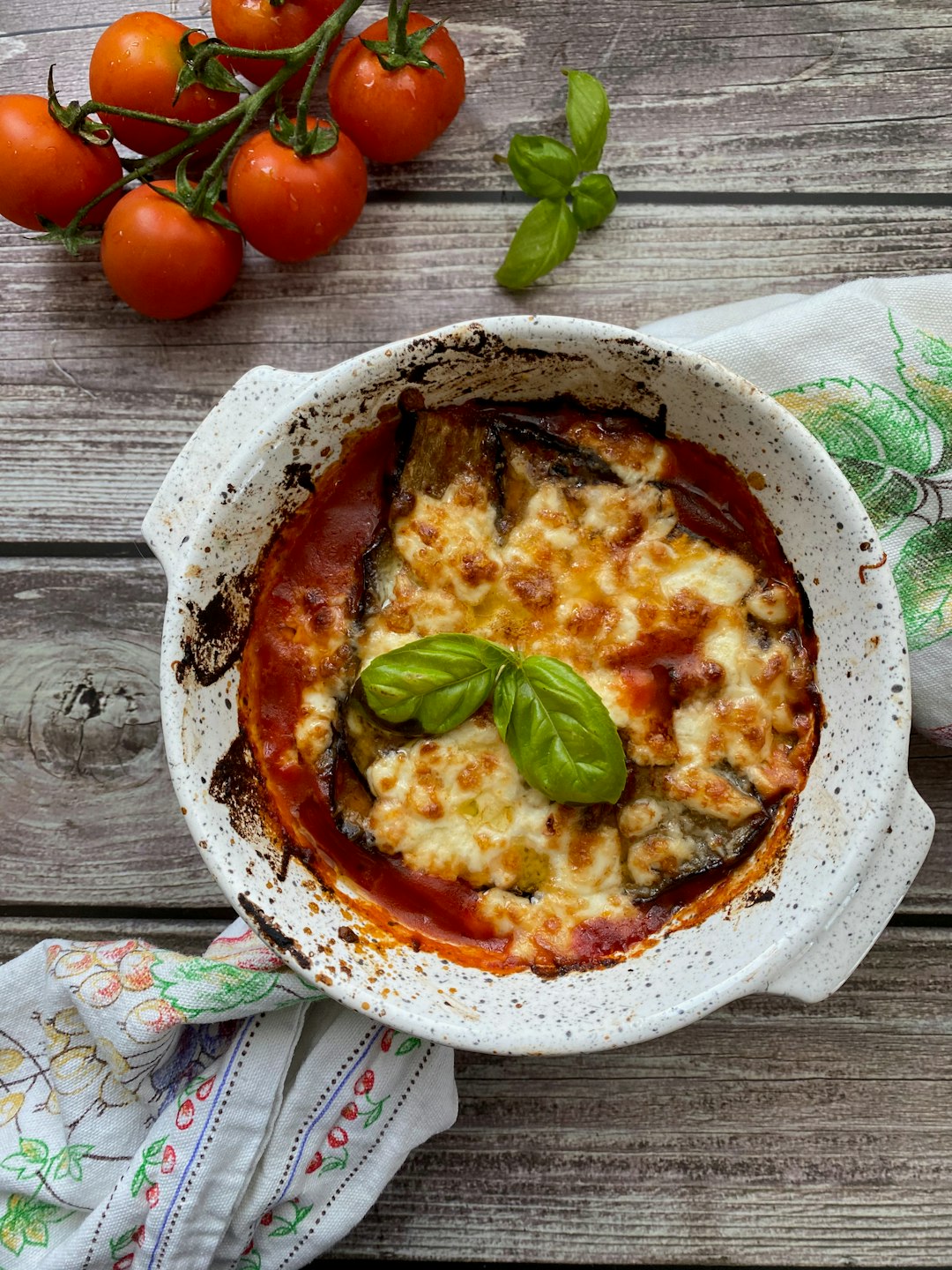Parmigiana
For the uninitiated, Parmigiana is a classic casserole-style dish made with thin slices of eggplant that are fried and then layered with tomato sauce, mozzarella, and parmesan cheese before being baked in the oven. What makes this delectable dish so beguiling is the combination of texture and flavors, as well as its versatility as a main course or side dish.
To make the perfect Parmigiana, it’s imperative to ensure that the eggplant slices are cooked to a golden crispiness without becoming soggy. This can be achieved by lightly coating the eggplant slices with a batter or egg mixture and then shallow-frying them in hot oil until golden.
Once the eggplant slices are cooked, these are then layered in an ovenproof dish with tomato sauce, mozzarella, and parmesan (or other Italian cheese) before being covered with aluminium foil and baked in the oven. After baking, the Parmigiana should be removed from the oven and served piping hot with a side salad or other accompaniments.
No matter how you decide to devour it, Parmigiana is sure to transport your taste buds to a culinary wonderland. Its amazing balance of salty, sweet, and umami flavors, combined with its crunchy exterior and soft interior will have you coming back for more. Whether you eat it as a main course or an appetizer - or perhaps just as a snack in between meals - Parmigiana truly leaves a lasting impression.
Parmigiana recipes
Amazing Parmigiana recipes sourced from the web.
The origin of Parmigiana
In the culinary community, Parmigiana is a dish of legendary renown, speckled throughout Italian culture for centuries. But where did its origins stem from?
Although this beloved Italian recipe is steeped in ambiguity, there are some prevailing theories on its inception.
One popular hypothesis postulates that the dish began in the city of Parma, Italy, in the 1600s. The people of Parma were amongst the first to start serving dishes made from layers of cooked vegetables, cheese, and tomatoes – thus, the ‘Parmigiana’ name was born.
This explanation is further supported by the presence of eggplant parmigiana on the menu at many of the region’s eateries in the 18th century.
However, this notion is contradicted by other stories which trace the dish’s roots to Sicily. This popular theory suggests that the dish was created by a group of nuns who used their limited resources to concoct a hearty meal of fried eggplant, tomato sauce, and melted cheese.
Others believe that the name is derived from the term 'parmiciana', which is an ancient Italian word for “in the style of Parmesan cheese”. This interpretation implies that Parmigiana is in essence a lasagna-style dish with Parmesan cheese layered throughout.
Regardless of its exact origin, Parmigiana remains one of the most beloved Italian dishes of all time. Its versatility and simple, yet delicious ingredients have captivated millions of taste buds for centuries, leading it to become an iconic symbol of Italian cuisine.
Types of Parmigiana
Parmigiana, a classic Italian dish, is one that is steeped in history, gustatory delights and culinary ingenuity. This beloved Italian classic has been the foundation of meals and late night snacks the world over for generations. From the timeless eggplant parmigiana to all its varied iterations, there is no denying that this versatile delicacy is a tastebud sensation like none other.
When it comes to Parmigiana, however, there are more than just one type. Depending on the region and even family traditions, there are countless varieties of this beloved dish. Let's take a quick tour of the different types of Parmigiana you can find around the world, each one as scrumptious as the next.
Let us start with the traditional Eggplant Parmigiana, which is arguably the most popular type of Parmigiana out there. This delectable dish consists first and foremost of slices of eggplant that are lightly fried before being layered with cheese and tomato sauce. A few pinches of oregano and a drizzle of olive oil provide an extra layer of flavour. The result? Deliciously melty layers of perfection that are sure to leave your taste buds in raptures.
Another classic type of Parmigiana is the veal Parmigiana. This scrumptious dish features thinly sliced veal that is coated in flour, then fried and topped off with tomato sauce, cheese, and melted butter. To add a touch of zing, some chefs finish off their masterpiece with a sprinkle of capers and/or white wine.
Then, if you’re feeling particularly adventurous, why not try the Porchetta Parmigiana? This is basically a variation of the classic Eggplant Parmigiana, but instead of eggplant, the dish is made with Porchetta - a Roman-style spit roasted pork. It is usually served with a generous dollop of tomato sauce, mozzarella, and pesto.
Finally, if you want something that is truly unique, why not try the Potato and Leek Parmigiana? This delightful dish is filled with slices of cooked potatoes, leeks and mushrooms, all sautéed together in a pan before being layered with goat cheese, gruyere, and a drizzle of cream. A sprinkle of rosemary and freshly grated Parmiggiano Reggiano finish off this delightful dish
No matter which variation of the Parmigiana you choose, rest assured that you will be rewarded with a delectable treat that is sure to tantalize your tastebuds. So, go ahead and explore the amazing world of Parmigianas - you won't regret it!



